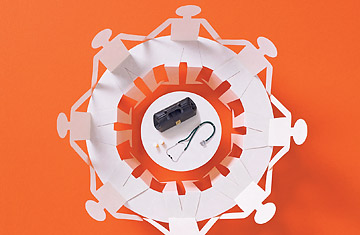
Group Therapy
The day that Dave deBronkart learned he had Stage 4 kidney cancer, his doctor handed him a prescription slip. On it, he'd scribbled ACOR.org. Within 11 minutes of submitting his first post to the Association of Cancer Online Resources, deBronkart, a software marketer in Nashua, N.H., received recommendations for top specialists — with links included — from patients on the site's kidney-cancer list. Within half an hour, an e-mail arrived from an ACOR member suggesting which scans might be appropriate and offering details about interleukin-2, the only treatment at the time that resembled a cure. "This is scary, terrifying," wrote another respondent, "but this list offers a lot of hope."
Thousands of patients like deBronkart are learning as much online — and from one another — as they are from their doctors. These laypeople are banding together and starting websites to help figure out which practitioners to see and which hospitals to avoid, which clinical trials show promise and which experimental treatments are bunk. But as people take more control of their health care — joining an empowerment movement many are calling Patient 2.0 — plenty of doctors are worried about the quality of the information that is being assessed as well as patients' ability to understand it. Or as Duke neurology professor Dr. Richard Bedlack puts it, "Just because you have the tools to work on your sports car doesn't mean you're ready to do it."
Frustrated by how long it takes cutting-edge knowledge to trickle down from the lab to the doctor's office, patients have been rushing to come up with their own ways of achieving what the health care industry calls rapid learning. In October, the Institute of Medicine (IOM), an influential advisory group, hosted a rapid-learning conference at which experts discussed some of the obstacles to aggregating and applying cancer-care data in real time, including privacy issues.
Sharing data — as well as giving people full access to their digitized health records — is being championed by deBronkart, now an online activist known as "e-patient Dave." He has teamed up with Dr. Daniel Sands, the physician who helped him kick his cancer into remission in 2007, to co-chair the newly created Society for Participatory Medicine, which encourages patients to learn as much as they can about their health and also helps doctors support patients on this data-intensive quest.
"Patients expect me to have seen every possible thing about melanoma out there, but if I did, I wouldn't possibly have time to take care of patients," says Duke oncologist Dr. Amy Abernethy, who spoke at the IOM conference about what rapid learning might look like when applied to real patients.
One private-sector initiative already has about 50,000 patients inputting their symptoms and treatment regimens and updating details of their disease progression. Wonder how others are coping with your particular ailment? PatientsLikeMe.com spells it out via color-coded charts and graphs. "When you need help, privacy is a terrible thing," says Jamie Heywood, who co-founded PatientsLikeMe in 2004 before his brother died of Lou Gehrig's disease, or ALS.
In 2008, in response to the publication of a small study indicating that lithium helps people with ALS, the site evaluated the collective experience of its members who had taken the drug and determined that lithium didn't work — a conclusion it reached six months ahead of similar findings from conventional clinical trials. (In an interesting sign of the times, PatientsLikeMe presented its observations in December at the international ALS symposium in Berlin.) Free to patients, the for-profit venture sells pharmaceutical companies the blinded data it compiles from its members about drug safety and efficacy.
The medical community is watching such Patient 2.0 endeavors with a mix of admiration and trepidation. Clinical trials take a long time because they're rigorously controlled, with close attention paid to sampling bias and methodology. "Traditional, long-standing, peer-reviewed ways of testing new treatments and interventions is not going to go out the window," says Dr. Sharon Murphy, a pediatric oncologist who organized the IOM conference. "There is a strong scientific underpinning that is lacking in this Web 2.0 stuff."
Concerned that too many ALS patients pursue sketchy treatments they discover online, Bedlack and about 40 other directors of ALS clinics set up a Twitter feed in April where patients can ask questions about off-label therapies. A team of doctors then investigates each query and posts their medical opinion online. "Everyone's heart is in the right place, but not everyone has the knowledge to do this the right way," Bedlack says of the Patient 2.0 movement.
The next logical step? Teach patients to be better scientists. In 2011, ALS researchers plan to launch a crash course similar to one offered for the past two years to Parkinson's patients; in three days it teaches laypeople why clinical studies should be controlled and blinded, and how to evaluate outcomes and assess journal articles.
One graduate of the Parkinson's workshop, Linda Morgan, a pharmacist in Asheville, N.C., who has participated in 10 research trials since her 2005 diagnosis, spends a lot of time not only figuring out which trials to enroll in but also urging fellow patients to become part of formal studies. Parkinson's clinical trials historically have had low participation levels, which delays the approval of new therapies. Morgan says she credits the workshop with making her feel as if she's "on the cutting edge," adding, "I like to know as much as I can."
